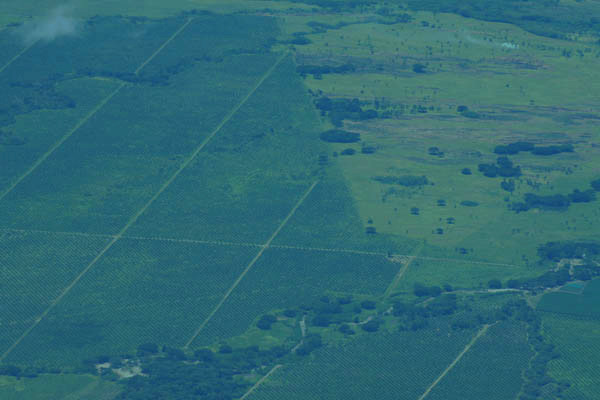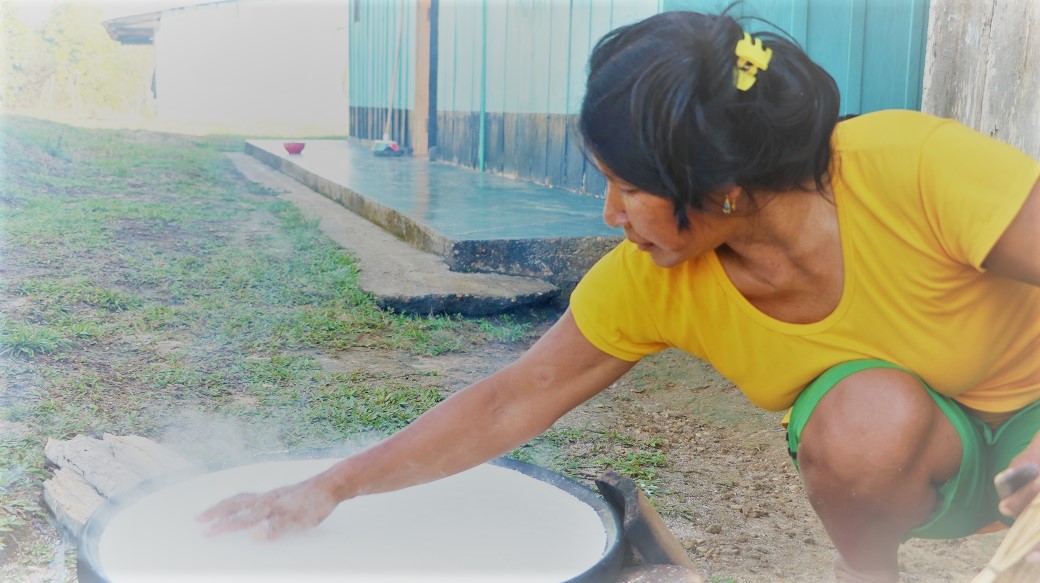La pérdida de bosques para la agricultura a gran escala y las industrias extractivas va de la mano con la violencia contra las mujeres

por John C. Cannon, publicado originalmente en Mongabay
La violencia de género sacude a las comunidades tras la pérdida de bosques: las mujeres en la provincia de East New Britain en Papúa Nueva Guinea dicen que se han enfrentado el aumento de la violencia doméstica, junto con problemas como embarazos adolescentes y el abuso de drogas, en sus comunidades con la llegada de la tala de árboles y las plantaciones de palma aceitera.
Continuar leyendo en ingles…
KOKOPO, Papua New Guinea — Change. That’s what Monica Yongol has seen in her 54 years. In that time, the loggers and then the oil palm companies have moved into the remote corner of Papua New Guinea where she raised her family, altering the contours of the society she knew.
“Things have changed a lot over the years for the women,” Yongol said. “The male members of society or even other males from other clans, they go ahead and make decisions in private spaces, which means women are not included.”
Often, those decisions determine the fate of the forests that the people of Mu, Yongol’s village in the rural local-level government of East Pomio on New Britain Island, have lived next to and subsisted on for generations. In East Pomio, part of Pomio district in East New Britain province, mothers have traditionally passed what they have down to their children. The principle has worked well, Yongol said, because women have a vested interest in ensuring that the land continues to provide for them.
“Women are looking at how they sustain the lives of their children in the future generations,” she said, “whereas men are more looking at short-term benefits.”

But the influx of “development” — first to harvest the island’s tropical timber in the 1990s, and more recently to set up oil palm plantations — backed by politicians and lawmakers in distant capitals, has shifted the calculus around the value of the land. Yongol and the other women gathered at the Vunapope Catholic Mission on a muggy November afternoon said they feel sidelined, shut out of decisions about what’s to happen to the forests where they have traditionally tended their gardens, gathered wood and harvested wild-growing food.
In another cruel twist, Elizabeth Tongne said, these attitudes also lead to the scapegoating of women for standing in the way of progress.
“They’re blaming us for stopping development on the land,” she said.
Tongne, sporting a worn T-shirt emblazoned with “Badass PACIFIC Feminist,” is the founder and director of Wide Bay Conservation Association, a local community-based organization named for the thumb of the Solomon Sea pushing into New Britain’s eastern shore next to East Pomio. She and her team at Wide Bay organized a seven-day convention to coincide with the International Day for the Elimination of Violence against Women at the Catholic mission just outside Kokopo, the provincial capital of East New Britain.
The women, leaders from Mu and a handful of other East Pomio villages, spent the days sharing their stories, identifying the problems they face, like domestic and community violence, and coming up with strategies to address them. Tongne and her team also aimed to provide them with information that would help their fellow women, as well as children and young girls, back home. They held presentations on the importance of education and avoiding teenage pregnancy, and they covered tangible skills such as farming, banking and “marketing” (selling goods like produce, tobacco and betel nut at market). As Tongne explained, the loss of the forest has left women and young girls with fewer options in their home villages.

A changing island
The forested mountains rising in sight of Kokopo are constant reminders of the island’s volcanic past — and present, if the 2014 eruption of the still-puffing Tavurvur volcano northwest of town is any indication. But the face of the island is shifting faster than the pace of geologic time, especially with the recent creep of oil palm over the past two decades. From the air, the crop’s progress lurches inward from the province’s outer edges: deep green canopy giving way first to brown earth and splintering logging roads and then to neat rows of the drooping, top-heavy trees that produce the world’s most popular vegetable oil.
The dense forests that covered more than 98% of the province as recently as 2010 have begun to wink out, according to satellite data. Tongne said that oil palm companies began building roads and clearing forest for plantations in East Pomio around 2008. Today, clearings and plantations creep up coastal hillsides, albeit at a much smaller scale than the expanses you’d see in Borneo or other parts of Southeast Asia.
Pomio is the remotest district in East New Britain, Tongne told me, and perhaps that’s saved it from some of the heavier forest loss seen in other parts of the province. Still, between 2001 and 2018, data from the University of Maryland show that tree cover has diminished by nearly 9% in the province, which has lost more than 1,370 square kilometers (529 square miles) of forest in that time. Much of that has happened in the last decade, with forest loss peaking at 201 km2 (78 mi2) in 2015, in a province covering a total of 15,816 km2 (6,107 mi2). Recent satellite images captured over the past few months show many new frontiers of deforestation encroaching into old-growth rainforest in East New Britain, including roads expanding inland from Pomio’s coast.
Around the world, corporations comb through ecosystems in search of resources to feed their bottom lines. Timber and palm oil are the top commodities in this South Pacific corner of Papua New Guinea, but similar patterns emerge whether the prize is oil, natural gas, copper or gold.
Replete as it is with valuable minerals and the world’s third-largest rainforest full of tropical timber, Papua New Guinea continues to struggle with economic development. Outsiders, meanwhile, have profited from those resources, as Australia did in its role as colonial administrator until 1975, and foreign companies from the U.S., Australia and China continue to do today.

The connection between violence and deforestation
Around the world, the “colonial” approach aimed at extracting valuable resources has destroyed “traditional and customary social relations” in local communities, Jeanette Sequeira, vice director and gender program coordinator at the Global Forest Coalition, said in a telephone interview.
“Often, this is in the land of indigenous peoples and local communities where there’s already insecure land tenure,” she said. “When you have corporations coming in and occupying these lands, there’s just total loss of governance.”
Global Forest Coalition and its more than 100 member organizations around the world have studied the interplay between gender and forest loss around the world. While the context of each local situation is unique, Sequeira said that the coalition’s partners have seen the impact that forest loss can have on the most vulnerable members of society. In many cases, that means women.
“Deforestation and climate change and environmental degradation do lead to an increase in violence against women,” Sequeira said. “I think that’s a claim we can make more and more.”
Along with the evaporation of the trees, the rights of women to determine what happens to the land they depend on have likewise vanished, Monica Yongol said, as the other women in the room nodded in agreement. The changes have jolted their communities. They’ve made it harder to provide for their families. And problems like teenage pregnancy, drug use and domestic violence in their communities have cropped up that the women say didn’t exist before.
Several argue that the problem is rooted in the silencing of women’s voices that’s become more common. Yongol recounted a meeting held by a landowner company, a common organizational structure in Papua New Guinea formed by landholders to negotiate with developers, such as logging companies, on behalf of communities.
A woman at the meeting stood up and asked why the group hadn’t informed all of the landowners about what would happen if the outside company interested in their land secured development rights, Yongol said. The tenets of free, prior and informed consent, accepted global standards set forth by the United Nations, hold that all community members should be aware of the plans for the land they depend on. In this case, however, the chairman dismissed her comment, telling her that she shouldn’t have a say — because she was a woman.

The influx of developers didn’t introduce such sexist attitudes to this part of Papua New Guinea. John Suka, a former teacher and now an elected councilor for the East Pomio rural local-level government, said that much of the problem stems from the “old ways.”
There is “no fairness or equality,” he said. “That’s the first thing, maybe because of some traditional or customary ways of thinking.”
Suka said that the upheaval in these societies triggered by surging interest from outside companies has exacerbated the situation. Without secure claims to the land, women are in a precarious position, especially when companies’ respect even for the rights of a community as a whole is tenuous at best.
Society prior to the arrival of logging companies and plantation developers was neither perfectly fair nor equitable, Suka said. But, he added, the temptation to turn land rights, however spurious, into upfront cash and other benefits for certain members has changed the respect for other customs, such as that of matrilineal inheritance. And it’s led some men to assume the roles of brokers in which they speak for entire communities.
At times, certainly, Suka said, “They have sold what they shouldn’t be selling.”

Cascading effects
Tongne said that these developments often touch off a chain of consequences for women.
“Once land is sold and taken away from them, there is a greater violence against women,” she said, for several reasons. The forests in East New Britain, and indeed many parts of the country, have long served as a storehouse of ready food and supplies. They’re essential in times of plenty, and they serve as vital emergency caches when times are tough.
“If there’s a drought, the women know where to find food in the forest,” Tongne told me.
But as logging and industrial agriculture replace forests close to home, women are forced to travel farther to gather food and other resources or to tend their gardens. That time spent on the road is time they’re not looking after their homes or raising their children, Tongne said.
“The men begin to beat them up,” she added. “Violence comes about because there is no food on the table.”
On these extended journeys to the forest, women might face the threat of attack from people from other villages or clans, or from the workers brought in from outside communities by the companies.
Before, “We had a lot of safety and security. We can walk, visit friends, long distances to other villages,” said Lucy Teine, a 50-year-old woman from the East Pomio village of Iwai. “But now, with the population that’s coming in to work in those developments, that’s now a threat for us.”
The fraying of the social fabric exacerbated by outsiders who might harbor different values is a symptom of a larger issue. Foundational blame for these changes lies with the mentalities that colonialism introduced, according to Sequeira.
While sexism has persisted in many societies around the world, “Indigenous communities had, in many cases, more equitable gender relations before the advent of colonialism,” she said. “Women and men had different, respected roles and status in communities.”

A global issue
The Global Forest Coalition and its partners have been investigating issues like these around the world. They’ve found that, while the details may change from place to place, there are broad commonalities among the communities affected by land development and extractivism, Sequeira said.
“We know that these [roles] became eroded as we had colonial administrations and just the complete dispossession and destruction of indigenous identity,” she said.
In Colombia, she said, women and men are supposed to have equal rights to the land. But, “That’s not really how it plays out.”
“You still have women who have to ask permission [from] their husbands or partners for being able to use a bit of land to cultivate medicinal herbs and other food for household consumption,” Sequeira said.
In many places — though not everywhere —laws are in place that should protect land rights, including those of women, she added. Where the system falls short is in implementing these statutes. What that means, broadly, is that forests suffer when women don’t have a say in land rights.
“[W]omen play a vital role in forest conservation,” Sequeira and her colleagues wrote in a November 2019 blog post. “Women interact daily with forests and other ecosystems, relying on them for household needs and their livelihoods, but also for conservation and restoration.”

Research conducted in India and Nepal and published in the journal Ecological Economics has shown that forests do better when women are involved in the decision-making process. But impediments, from patriarchal attitudes to “wife bashing” as domestic violence is viscerally referred to in East New Britain, can stand in the way of that progress on both the conservation and social justice fronts.
A 2010 countrywide study , published in the journal Contemporary PNG Studies, found that almost two-thirds of women had suffered gender-based attacks.
John Suka said addressing the problem of violence is critical. But up until now, it’s not been something that’s been seen as a priority. In most cases, government agencies don’t have the capacity — or the will — to enforce these laws, he said.
“All the levels of government have the responsibility, but the point is, they don’t implement what they are supposed to be implementing,” Suka added. “It’s a great failure across the board.”
He said that a shift in thinking is called for.
“Of course, before we were kept in a little box with our own way of life,” he said. “Today, we are in a new world.”
Sequeira said she agrees that changing systemic attitudes is paramount.
“What we need is more than just policies and sanctions,” she said. Elsewhere, she added, campaigns and dialogues around gender equality and women’s rights have been effective at transforming the “culture of violence.” Women, too, have taken control of their own plight, forming “brigades” that accompany vulnerable women on trips outside the community — say, to the forest.

Sequeira said women in other parts of the world also engage the broader community using “naming and shaming protocols” to call out perpetrators of violence against women. And both men and women partake in neighborhood watch programs.
She also said that violence on the personal level must be seen through the broader lens of what’s happening to people’s land in the community traced back to colonial paradigms.
“Dispossession and loss of land rights and extractivism … are also forms of patriarchal violence,” Sequeira said in the interview.
In their blog post, she and her colleagues wrote that not only must women deal with the traditional ways of thinking that often relegate them to less-than status. They “must often defend their forests against the massive threats from extractivism, whether it be industrial livestock and agriculture (such as the production of soy and palm oil) or mining mega-projects.”
“Forest conservation can never be successful or bring about social justice,” they added, “if it does not address the prevalence of the various manifestations of violence against women, and especially so on the front-lines of the environmental and climate crisis.”
Banner image of the Tovanumbatur, Tavurvur and Turanguna volcanoes near Kokopo, East New Britain province, by John C. Cannon/Mongabay.
John Cannon is a staff features writer at Mongabay. Find him on Twitter: @johnccannon
Citation:
Agarwal, B. (2009). Gender and forest conservation: The impact of women’s participation in community forest governance. Ecological Economics, 68(11), 2785-2799. doi:10.1016/j.ecolecon.2009.04.025
Ganster-Breidler, M. (2010). Gender-based Violence and the Impact on Women’s Health and Well-being in Papua New Guinea. Contemporary PNG Studies, 13, 17.
Featured image credit: Tim Scott/Flickr










